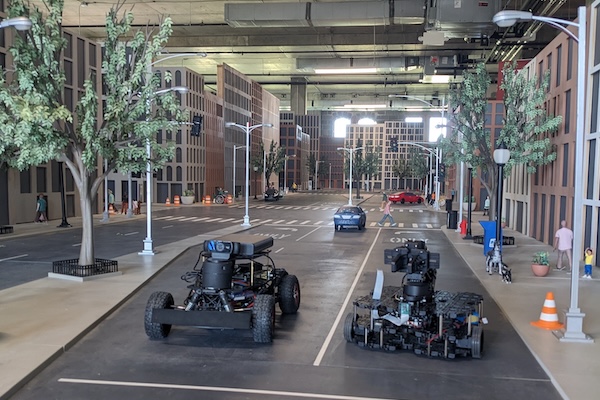Advancing robot autonomy in unpredictable environments
Yiannis Kantaros will enable teams of robots to interact collaboratively, perceive and respond to their environment with a CAREER Award from the National Science Foundation

Recent advances in robotics and artificial intelligence allow robots to carry out diverse tasks in manufacturing, warehouse operations, delivery services and more, benefitting humans who would otherwise undertake these physically demanding – and potentially dangerous – jobs.
However, robots remain passive to their environment as they are not yet able to interact intelligently with or directly manipulate it to respond to events that may prevent mission completion. This shortfall becomes particularly pronounced in unpredictable environments where unexpected physical barriers or gaps can thwart robots’ progress toward mission objectives. In these situations, current autonomy algorithms are left with no recourse but to declare mission failure.
Yiannis Kantaros, assistant professor in the Preston M. Green Department of Electrical & Systems Engineering, has received a five-year, $591,457 Faculty Early Career Development (CAREER) Award from the National Science Foundation (NSF) to address these limitations. With the NSF’s support, Kantaros aims to advance robot intelligence and enable teams of robots to interact collaboratively with their perceived environment to overcome unanticipated obstacles and events.
CAREER awards support junior faculty who model the role of teacher-scholar through outstanding research, excellence in education and the integration of education and research within the context of the mission of their organization. One-third of current McKelvey Engineering faculty have received the award.
“Safety-critical applications such as disaster relief and search-and-rescue missions often occur in unstructured environments that are challenging for humans to navigate, requiring teams of robots to be deployed,” Kantaros said. “One major challenge is the unpredictable nature of these environments, which can hinder robots from completing tasks due to unexpected obstacles, debris, structural changes or physical gaps that block access to critical areas.
“Unlike humans, robots lack the ability to interact intelligently with their surroundings to overcome these issues,” Kantaros continued. “My research will address this challenge by enabling teams of robots to interact with their environment and overcome challenges by intelligently reconfiguring it, for example, by pushing obstacles out of the way or using objects to bridge gaps.”
By marrying artificial perception with decision-making capabilities, Kantaros will equip robots with the ability to not only perceive their surroundings but also to take a more active approach and modify surroundings to achieve their goals. A central component of his project is developing perception-based planning capabilities for robot teams operating in unknown and unstructured environments.
“The proposed research will result in fundamental robot capabilities that will substantially enhance multi-robot planning methods in unstructured environments,” Kantaros said. “The developed planning algorithms will enable robot teams to interact with the perceived environment, accommodating imperfect AI-enabled perception and effectively responding to unforeseen events that could hinder task completion.”
Imagine a fleet of robots working in tandem, dynamically reshaping their environment to navigate through treacherous terrain or deliver aid to remote locations with unprecedented efficiency and adaptability.
“These autonomy algorithms are expected to offer unprecedented flexibility in various humanitarian and scientific applications in unknown environments, leading to enhancements in mission performance and robot safety, ultimately saving lives and resources,” Kantaros noted. “Important applications include search and rescue operations, disaster relief efforts, and environmental monitoring and surveillance.”




